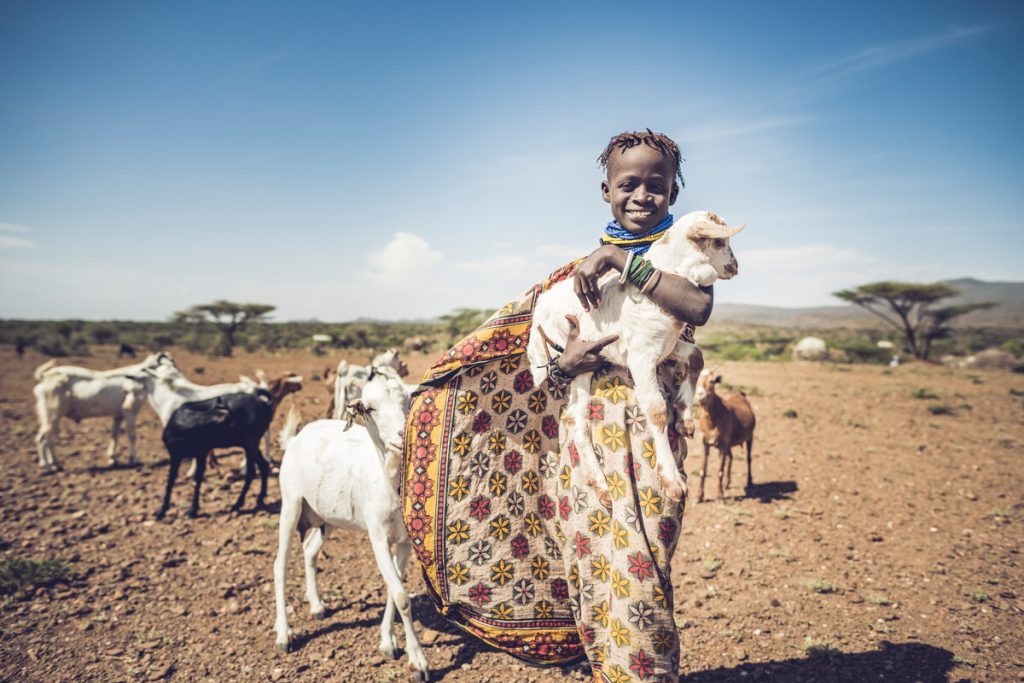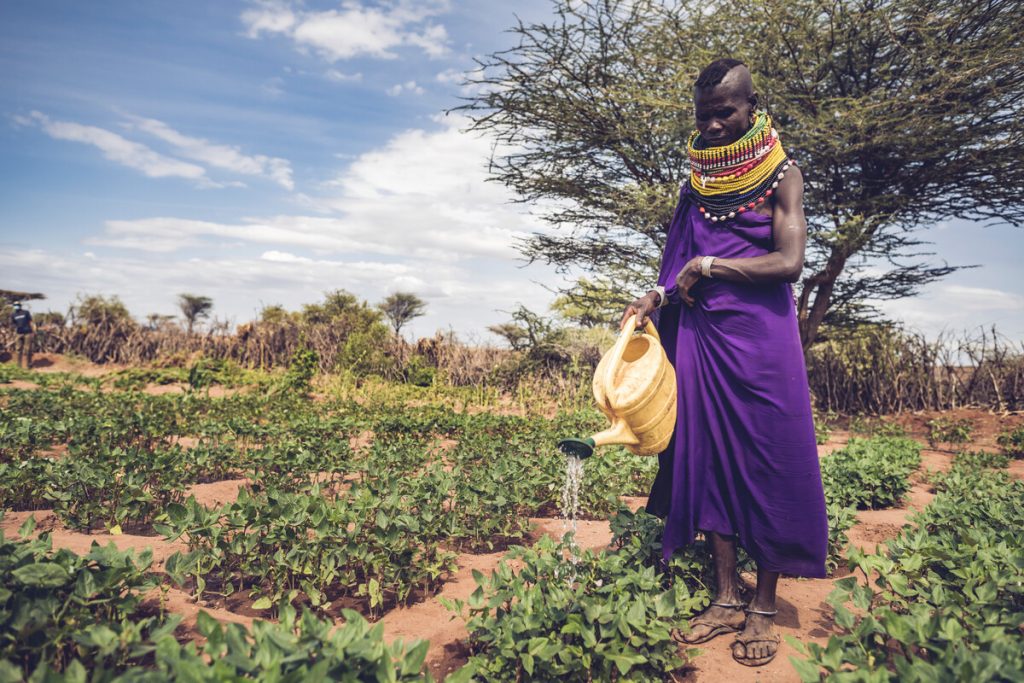Posts Tagged ‘Sahelian Drought’
How To Create Change That Lasts
It was a late afternoon in 2017 when we pulled up in front of the giant structure. Eight hours of driving off-road through rock, sand and empty riverbeds had left our team sore and tired, yet the sight alone was enough to shake us from our weariness. In front of us, upon the western shore of Lake Turkana, stood what appeared to be a factory — disheveled, empty and eerily silent.
Following the Sahelian drought of the mid-1980s, massive famine devastated the Turkana region. As is so often the case with large-scale global disasters, the initial compassion surge propelled aid rapidly into the region.
International organizations set up food distributions, medical teams flew in to staff temporary feeding clinics and the Turkana people were once again shown that when things get just bad enough, Western forces will undoubtedly swoop in and try to save the day.
That day, we witnessed one of these examples, as it blocked the blistering rays of afternoon sun from our faces. Twenty years and 150 million U.S. dollars later, a fishery had been completed for the people of Turkana. Its promise? To prevent the people of the region from ever facing starvation again. The reality? A tragic landmark of good intentions gone wrong. The people of Turkana, you see, do not eat fish.
The Elephant in the Room
In his book, When Helping Hurts, Steve Corbett recounts an old African fable:
Elephant and Mouse were best friends. One day Elephant said, “Mouse, let’s have a party!” Animals gathered from far and near. They ate. They drank. They sang. And they danced. And nobody celebrated more and danced harder than Elephant. After the party was over, Elephant exclaimed, “Mouse, did you ever go to a better party? What a blast!” But Mouse did not answer. “Mouse, where are you?” Elephant called. He looked around for his friend, and then shrank back in horror. There at Elephant’s feet lay Mouse. His little body was ground into the dirt. He had been smashed by the big feet of his exuberant friend, Elephant.
Western missions and aid interventions, Corbett writes, are “like dancing with an Elephant. Elephant does not mean to do harm, but he [doesn’t] understand the effects he [is] having on Mouse.”
Sadly, the example of the fishery in Turkana is a tangible manifestation of this fable. It seems that every year we hear horror stories of time and money poured into well-meaning aid interventions that fail to solve the problems they intended to, create damaging patterns of dependency or, worst of all, create bigger problems for their intended beneficiaries.
World Relief Chooses a Different Path
These well-intentioned interventions, while tragic, have taught us important lessons. In fact, they are a central part of how World Relief developed our model of relief and development. We understand that lasting change comes not with quick fixes or band-aid solutions, but through a deep understanding of the unique beliefs, cultural traditions, resources and needs of the communities in which we work.
Such an approach ensures that in places like northern Turkana, we understand that this nomadic, pastoralist community survives on a diet of meat, milk and blood, and that asking them to eat fish — a species they believe are directly related to snakes and associate with danger — is not a quick fix, even in cases of famine.
In seeking to fight against famine in Turkana, we have worked closely with local churches and leaders to brainstorm creative solutions to combat malnutrition.

Over the last 12 years, we’ve developed a robust agricultural program in the region that helps expand and diversify the Turkana diet beyond traditional food sources, as well as teach desert farming techniques to help conserve water.
We’ve also bred drought-resistant goats that can survive for longer periods of time without water and launched poultry farming and beekeeping groups that are not only helping the people of Turkana diversify their diets, but also earn income from sustainable food sources. These innovative, culturally-relevant solutions work for the unique challenges and needs of the population and have saved lives in the face of more recent famine and drought.
Grassroots interventions like the ones in Turkana not only honor local knowledge, culture and community resources, but they also pave the way to break the cycle of Western aid that disempowers so many communities in the developing world.
Becoming a Better Partner
In 2010, African economist Dambisa Moyo wrote in her book, Dead Aid, about the broken systems that keep many communities trapped in cycles of dependence on outside aid:
“Africa is addicted to aid. For the past sixty years it has been fed aid. Like any addict it needs and depends on its regular fix, finding it hard, if not impossible, to contemplate existence in an aid-less world. In Africa, the West has found its perfect client to deal to.”
These words, though difficult and perhaps a bit controversial, echo all too true for many development practitioners who frequently hear petitions for food and money when first entering new communities.
It’s also precisely why, when we first enter communities, we begin by bringing local churches together to discuss the ways in which they can work together to solve their own problems. In fact, local pastors, community leaders and a global network of over 95,000 local volunteers, are responsible for the implementation of our programs around the world.
What’s more, 95% of our staff are local to the communities in which they work. Not only do they have an inside voice and understanding that no outside organization can bring, they also bring a passionate commitment for seeing their communities thrive. They will remain in their communities long after we depart — creating, leading and sustaining community efforts toward change.

World Relief’s Commitment to Lasting Change
Our world today is obsessed with quick fixes, but at World Relief, we’re fighting for change that lasts. Today, drought is once again threatening severe famine as Turkana. What’s more, the war in Ukraine has caused food prices to spike and rates of malnutrition have increased among children.
And yet, in the imdst of renewed crisis, local churches are rising to the occasion, meeting needs and developing solutions to care for those who need it. Micah Kachoi, World Relief Kenya’s Church Empowerment Zone Coordinator in Turkana said:
“[Churches] are thinking outside the box and asking, ‘What can we do?’
Despite the food shortage and drought, churches are still reaching out to identify the vulnerable people within their communities and mobilizing resources like food, clothing and medical care to support large populations of people who are suffering.”
At World Relief, we refuse to pour time, resources and money into short-term, misdirected solutions in efforts to address complex long-term problems. We believe the biggest problems of our world — disasters, extreme poverty, violence, oppression and mass displacement — have to be tackled at the root, with locally-driven sustainable solutions.
Only then can we ensure that projects like the Turkana fishery never happen again. Yes, this approach takes time. Yes, it is difficult to measure. Yes, in our fast-paced, results-driven culture of immediate gratification, it is hard. But we do it because we know that this approach is transformational — both today and for generations to come.
Thank you for your commitment to creating change that lasts. We could not do this work without you.

Francesca Albano joined World Relief in 2016 and has played a variety of roles with progressively expanding responsibilities. She is a passionate storyteller and cross-cultural communicator, having spent much of her childhood in Kenya and the U.K., before immigrating to the U.S. as a teenager. She holds a B.A. in Anthropology and International Affairs from Colby College and an M.A in Strategic Marketing Communications from Georgetown University, and is also a Storybrand Certified Guide. Today, her passions and expertise converge to help us tell the story of what God is doing through World Relief and the local church all around the world. She is deeply committed to stewarding this story, and the stories of those we serve, with great care and dignity as we also seek to inform, inspire and invite others to come alongside the work of World Relief. She lives close to Boston with her husband, Joe, and son, Teddy.
The Path to Lasting Change
Change isn’t easy, and it isn’t fast. Change shows up day after day, month after month, year after year. The path to change requires faithfulness, consistency and a commitment to going the distance — no matter how far or how long it takes.
I remember the day our team pulled up to the abandoned factory on the western shore of Lake Turkana. Eight hours of driving off-road through rock, sand and empty riverbeds had left our team sore and tired, yet the sight of the looming, disheveled building was enough to shake us from our weariness.
Following the Sahelian drought of the mid-1980s, massive famine devastated the Turkana region. As is so often the case with large-scale global disasters, the initial compassion surge propelled aid rapidly into the region. International organizations set up food distributions, medical teams flew in to staff temporary feeding clinics and the Turkana people were once again shown that when things get just bad enough, Western forces will undoubtedly swoop in to save the day.
Now, blocking the blistering rays of the afternoon sun from our faces, stood one of these examples. Twenty years and 150 million U.S. dollars later, a fishery had been completed for the people of Turkana. Its promise? To prevent the people of the region from ever facing starvation again. The reality? A tragic landmark of good intentions gone wrong. The people of Turkana, you see, do not eat fish.
In 2010, African economist Dambisa Moyo wrote in her book, Dead Aid, “Africa is addicted to aid. For the past sixty years, it has been fed aid. Like any addict it needs and depends on its regular fix, finding it hard, if not impossible, to contemplate existence in an aid-less world. In Africa, the West has found its perfect client to deal to.”
These words, though difficult to hear, echo all too true for many development practitioners who frequently hear petitions for food and money when first entering new communities. The fishery in Turkana is a tangible manifestation of Moyo’s claim. It seems that every year we hear horror stories of time and money poured into well-meaning aid interventions that fail to solve the problems they intended to, create damaging patterns of dependency or, worst of all, create bigger problems for their intended beneficiaries.
These well-intentioned interventions can leave those of us that long to see lasting change take root feeling overwhelmed, perplexed and even defeated. Is there a solution? Is it possible to help without creating dependencies? Is there truly a way to bring flourishing to communities across the globe?
While stories like this one from Turkana are tragic, they’ve taught us important lessons.
In fact, they are a central part of how World Relief has developed our model of relief and development because they’ve helped us understand that lasting change comes not with quick fixes or band-aid solutions, but through a deep understanding of the unique beliefs, cultural traditions, resources and needs of the communities in which we work.
It means that in places like northern Turkana, we understand that this nomadic, pastoralist community survives on a diet of meat, milk, and blood, and that asking them to eat fish – a species they believe are directly related to snakes and associate with danger – is not a quick fix, even in cases of famine.
When seeking to fight against famine in the region, we worked closely with local churches and leaders to brainstorm creative solutions to combating malnutrition amongst the Turkana population. Today, we run a robust agricultural program in the region that helps expand and diversify the Turkana diet beyond traditional food sources, as well as teach desert farming techniques to help conserve water. We’re also breeding drought-resistant goats that can survive for longer periods of time without water when drought strikes, providing a prolonged food source for the people of Turkana.
Grassroots interventions like the ones in Turkana not only honor local knowledge, culture and community resources, but they also pave the way to break the cycle of Western aid that disempowers so many communities in the developing world.
It’s also precisely why, when we first enter communities, we begin by bringing local churches together to discuss the ways in which they can work together to solve their own problems. In fact, local pastors, community leaders and a global network of over 95,000 local volunteers are responsible for the implementation of our programs around the world. Our international staff, 95% of whom are local to the communities in which they work, have an inside voice and understanding that no outside organization can bring. What’s more, they will remain in their communities long after we depart — creating, leading and sustaining community efforts toward change.
Over the last six months, it has become apparent that the quick fixes and bandaid solutions our nation and our world have often gravitated toward are no longer working. The COVID-19 pandemic coupled with continued systemic racial injustices in the U.S. have shed light on the truth that problems must be faced at the root and lasting solutions cannot be rushed. It takes time, attention and intention to forge the path to lasting change, no matter what issue you’re trying to address.
At World Relief, we’re embracing this approach as we tackle some of the world’s biggest problems — disasters, extreme poverty, violence, oppression and mass displacement. We are devoted to addressing the root causes of these issues with locally-driven, sustainable solutions that ensure transformation remains long after World Relief is gone. Yes, this approach takes time. Yes, it is difficult to measure. Yes, in our culture of immediate gratification, it is hard. But we know this approach works. And we want you to join us in it.
Will you join us as we forge the path to lasting change?



